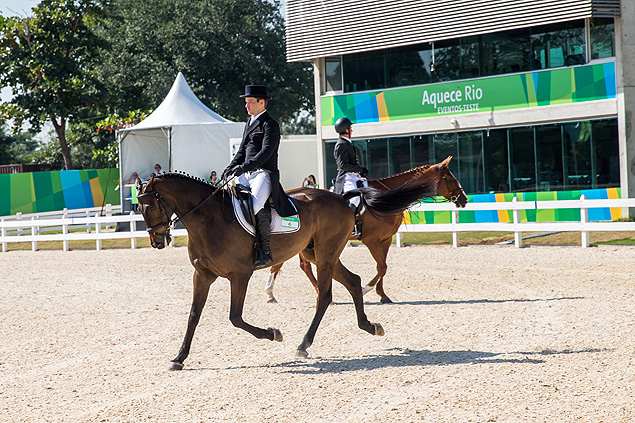Latest Photo Galleries
Brazilian Markets
17h36 Bovespa |
-0,07% | 124.646 |
16h43 Gold |
0,00% | 117 |
17h00 Dollar |
+0,29% | 5,1640 |
16h30 Euro |
+0,49% | 2,65250 |
ADVERTISING
Fear of Disease Harms Brazilian Equestrianism on the Eve of the Olympic Games
02/29/2016 - 08h31
Advertising
MARCEL MERGUIZO
PAULO ROBERTO CONDE
FROM SÃO PAULO
The fear of glanders, a lethal equine disease, is affecting the schedule of all countries for the equestrianism competitions of the Rio 2016 Olympic Games. But it harms Brazil especially.
The disease is rare and as it is transmitted by bacteria, the Brazilian government decided to interdict several stud farms in Brazil and, to improve safety, it isolated the venue of the competitions at the Deodoro complex. The delegations will only be allowed to arrive at the venue shortly before the Olympic Games.
The decision took away from the Brazilian team the preliminary advantage of hosting a competition at home.
| Ricardo Borges/Folhapress | ||
 |
||
| Europe has prohibited the entrance of horses coming from Brazil. |
In the case of the show jumping team, which includes Olympic medal winners Rodrigo Pessoa and Álvaro de Miranda Neto, also known as Doda, it was necessary to change preparations and even resort to improvise.
The team's director, Caio de Carvalho, says that the plan was for the riders and their horses, which spend most time in Europe, "to arrive at least one month before the Rio Olympic Games to train in Brazil."
With the change, the delegation is likely to arrive in Rio de Janeiro on August 8, three days after the beginning of the super event.
Carvalho says that the acclimatization in Brazil would give the team an edge against the other competitors. Brazil ranked fifth in the 2014 World Equestrian Games and the group is a good candidate to win a medal - it won the bronze medal in Atlanta-1996 and Sydney-2000.
The solution found was to make the final adjustment abroad. The base will be Doda's training center in Valkenswaard, in the Netherlands.
"The team could even come to Brazil before the Olympics to practice, but the horses would not be allowed to return to Europe because of the law and because they all live there," said Carvalho, an Olympic rider in the 1984 Olympic Games in Los Angeles.
One of the athletes representing Brazil in the dressage team at the 2015 Pan American Games and the World tournament in 21014, horseman Pedro Almeida, 22, had to adapt his preparation as he sought to participate in the Olympic Games.
"Europe has prohibited the entrance of horses coming from Brazil, so we have to hold quarantine before we go to Germany, says Almeida, who is now in Argentina with his twin brother Manuel, waiting to travel back for the European competitions.
"If any horse is found with the symptoms, it cannot participate in the Olympic Games and that is why the equestrian eventing, show jumping and dressage teams have already been taken out of Brazil and will stay there until the Olympics."
As the horses ridden by Pedro and his brother were raised by themselves in Brazil, they had to make a stopover in Argentina. Their older sister, Thaisa Almeida, 26, preferred to carry out the quarantine in the U.S. Their other sister, Luiza, 24, who competed in the two previous Olympic Games, is already training in Germany.
"Deodoro has a serious problem regarding glanders, that is why there are no horses there or riders who want to practice there," says Pedro.
The place that will host the Rio-2016 Equestrianism competitions received a test event in August 2015 but it was not attended by foreigners.
At the occasion, two horses participated in the event after their owner showed negative tests for the disease valid for 60 days. The stud farm in São Paulo where the horses were kept was interdicted following suspected cases of glanders.
THE OTHER SIDE
The International Federation for Equestrian Sports (FEI), says that Mapa (the Ministry of Agriculture and Supply) informed that no signs of glanders were observed in the horses in Deodoro before the venue was prepared for the Olympic Games.
"As additional precaution, all the Army's horses in Deodoro underwent more tests. And we were informed that all the samples were returned with negative results," FEI told Folha.
A health security corridor will be set up between the Rio de Janeiro international airport and the facilities in Deodoro to guarantee the safety of the horses arriving from Europe. As a part of biosafety measures, the Olympic areas have been closed since January 29. The FEI says that the horses will arrive in Rio after July 29.
The Brazilian Equestrian Confederation (CBH) has confirmed that the facilities will be isolated. "Health security is guaranteed through fallowing. There haven't been any horses in Deodoro for eight months, therefore the place is free from diseases," says Luiz Roberto Giugni, the president of CBH.
"The CBH, in a partnership with the Brazilian Olympic Committee (COB) and the Ministry of Sports, has sent the majority of its horses to train abroad. The horses that stayed in Brazil will continue with their preparation unaltered. They were sent to clubs and horse riding schools under control and free from diseases," said Giugni
Translated by THOMAS MUELLO
Read the article in the original language



